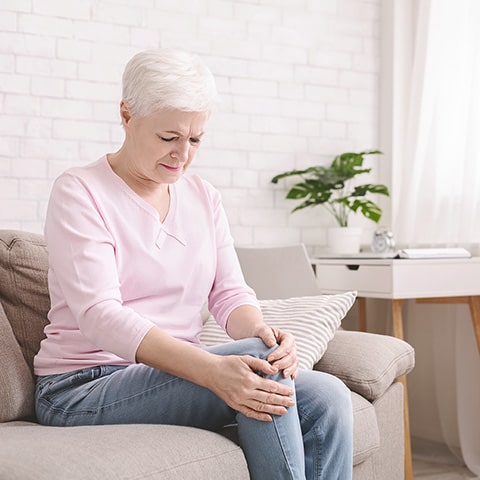Osteoarthritis inevitably takes its toll on the daily lives of those affected as well as their family and friends. It can be extremely debilitating when it occurs at an age when the individual is already frail and coping with different illnesses. Various outside agencies should be called upon to provide domiciliary care which will allow the individual to stay in their own home. However, a move to a care home should be considered.

Osteoarthritis, a prevalent condition among seniors, can significantly affect their daily lives. As joints deteriorate over time, individuals experience pain, stiffness, and reduced mobility, which can pose various challenges. Here's a closer look at how osteoarthritis impacts daily life for seniors:
Mobility limitations:
Osteoarthritis can hinder seniors' ability to move comfortably. Tasks like walking, standing, or even getting in and out of chairs may become arduous due to joint pain and stiffness. This limitation can lead to a loss of independence and require assistance from caregivers or family members.
Find YOUR ideal care home NOW!
Persistent pain and discomfort:
Chronic joint pain is a hallmark symptom of osteoarthritis. Seniors may experience ongoing discomfort in affected joints, making simple activities like reaching, bending, or grasping objects challenging. Managing this pain becomes a daily concern and may impact mood and overall well-being.
Activity restrictions:
The limitations imposed by osteoarthritis can restrict seniors from engaging in activities they once enjoyed. Hobbies, sports, and leisure activities may need to be modified or abandoned altogether due to joint pain and physical limitations. This can lead to feelings of frustration and a sense of loss.
Emotional impact:
Coping with the physical challenges of osteoarthritis can take a toll on seniors' emotional health. Feelings of frustration, sadness, or even depression may arise as they grapple with the changes in their bodies and lifestyles. Maintaining a positive outlook and seeking support from loved ones or professionals is essential.
Sleep disturbances:
Joint pain can disrupt seniors' sleep patterns, leading to insomnia or restless nights. Difficulty finding a comfortable sleeping position or waking up due to pain can result in fatigue and daytime drowsiness. Poor sleep quality can exacerbate other symptoms and impact overall health.
Social isolation:
Osteoarthritis can sometimes lead to social withdrawal as seniors may feel self-conscious about their condition or fear being a burden to others. Limitations in mobility or discomfort during social outings may cause them to decline invitations and withdraw from social interactions, leading to feelings of loneliness.
Caregiver burden:
Family members or caregivers may shoulder the responsibility of providing support and assistance to seniors with osteoarthritis. This can involve helping with daily tasks, providing emotional support, and coordinating medical care. Caregiver burnout is a common concern and requires adequate support and respite care.
Osteoarthritis Management Strategies
| Management Strategy | Benefits | Implementation Tips |
|---|---|---|
| Low-Impact Exercise | Improves mobility and reduces stiffness without stressing joints. | Swimming, yoga, and gentle walking are ideal options. |
| Assistive Devices | Reduces strain on joints and improves balance. | Use canes, walkers, orthopedic shoe inserts, and braces. |
| Medication & Supplements | Helps manage pain and reduce inflammation. | Consult a doctor for pain relievers, corticosteroids, or glucosamine supplements. |
| Physical Therapy | Enhances joint function and flexibility. | Engage in personalized physiotherapy sessions. |
| Weight Management | Reduces pressure on weight-bearing joints. | Maintain a healthy diet and engage in regular physical activity. |
| Hot & Cold Therapy | Provides immediate relief for pain and swelling. | Use ice packs for swelling and heat pads for stiffness. |
| Joint Protection Techniques | Minimizes stress on affected joints. | Use ergonomic tools, avoid heavy lifting, and distribute weight evenly. |
Despite these challenges, seniors can take steps to manage osteoarthritis and improve their quality of life. This may include staying active with low-impact exercises, maintaining a healthy weight, using assistive devices, and seeking medical treatment or physical therapy.
FAQ: Osteoarthritis & Senior Care
-
What is the most common symptom of osteoarthritis?
The most common symptom is persistent joint pain and stiffness, especially after periods of inactivity or excessive movement. -
Can osteoarthritis be cured?
There is no cure, but it can be managed through medication, lifestyle changes, and therapy. -
How can seniors reduce osteoarthritis pain?
Regular low-impact exercise, physical therapy, and pain management techniques like hot/cold therapy can help alleviate pain and improve mobility. -
Is it safe for seniors with osteoarthritis to exercise?
Yes, gentle exercises such as swimming, walking, and yoga are beneficial for improving flexibility and reducing stiffness without putting excessive strain on the joints. -
What foods help with osteoarthritis?
A diet rich in omega-3 fatty acids (found in salmon, flaxseeds, and walnuts), antioxidants (from berries and green tea), and calcium (from dairy and leafy greens) can support joint health. -
When should a person with osteoarthritis consider assisted living or a care home?
When joint pain and mobility limitations start interfering with daily activities, such as dressing, cooking, or walking safely, a care home with specialized support may be a good option. -
Can osteoarthritis lead to disability?
In severe cases, osteoarthritis can cause significant mobility limitations, making independent living difficult. Early intervention and proper management can help slow its progression. -
What medical treatments are available for osteoarthritis?
Pain relievers, anti-inflammatory medications, corticosteroid injections, and in some cases, joint replacement surgery can help manage symptoms. -
How can a care home support someone with osteoarthritis?
Care homes provide assistance with mobility, daily activities, physical therapy, and pain management to improve quality of life.
Do not hesitate to contact our elderly care advisors to help you find the most suitable nursing home for your loved one with osteoarthritis. Call Senior Home Plus on 0203 608 0055 or fill out this form.

